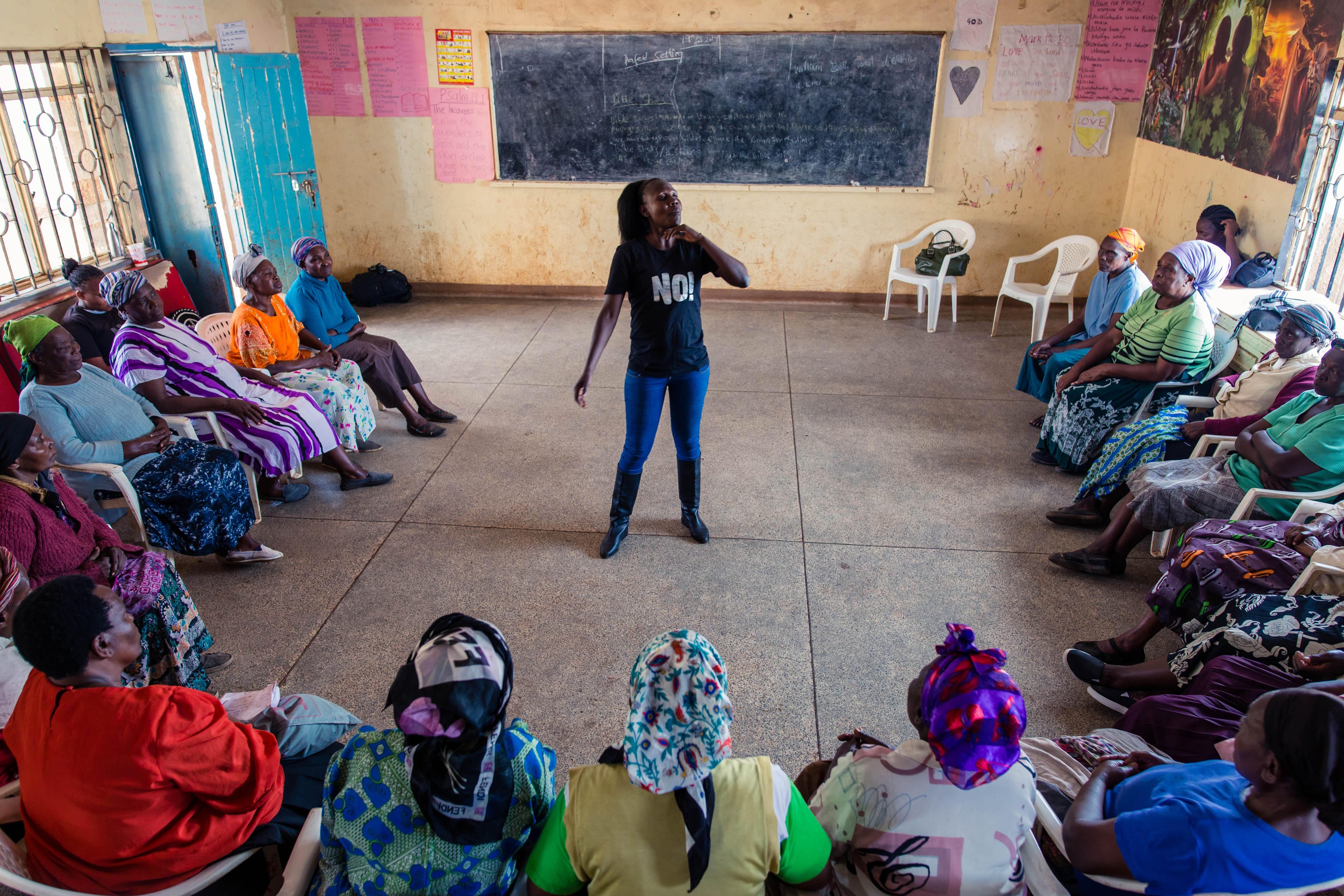All People as Protagonists of their Own Stories.
By Kippy Joseph, Senior Advisor, and Katie Carrasco, Environment, Social Responsibility & Governance Director
Mar 08, 2021
Image: Nairobi, KENYA, February 23, 2017: Everlyne Odhiambu (C), 36, one of the ‘Shosho Jikinge’ (‘grandmother defend yourself’) group instructors in the Kibera township, demonstrates techniques to escape potential attackers and encourages the participants to use their voices and scream “No” in case of an assault.
As we at GIF join others around the globe to celebrate International Women’s Day — reflecting on this years’ theme of challenging gender bias and inequality and creating an inclusive world — we are also focusing on how GIF can leverage our model to deploy capital at the intersection of gender equality, innovation and impact-first investing in order to achieve the International Women’s Day goals.
GIF’s CEO Alix Zwane likes to sum-up the equality imperative by noting that “All people should be the protagonists of their own stories,” emphasising the need for individuals to have agency by being able to define and act on their own goals. In the field of global development, this manifests by having a voice, control over one’s assets and over decisions related to one’s body including a freedom from violence. In other words, “agency” is key in creating an inclusive world.
This is particularly true for women and girls who, because of unequal power relations in many countries, can not claim agency, and it is compounded by the COVID-19 pandemic which will result in a staggering 435 million women and girls living in extreme poverty according to recent research by UN Women.
Increasing the agency of women and girls is both an investment theme and a strategic goal at GIF and we are excited to showcase the frame we use internally to ensure these goals are reached.
Innovations can catalyze shifts for individuals, communities and societies as a whole. GIF invests, therefore, in gender equality innovations that have the potential for large-scale impact and works to ensure that all GIF investments analyze the gender risks and opportunities relevant to their innovation because gender inequality prevents women and girls from having and acting on their agency.
Over the last year we have made investments through our Innovating for Gender Equality fund that bring this framework to life. In partnership with Global Affairs Canada, GIF supports innovations that explicitly challenge gender bias and inequality. We are proud to fund the important work that No Means No Worldwide, for instance, do in this area.
No Means No Worldwide engages girls and boys to address sexual rights and violence. Each participant in a NMNW programme learns skills and gains agency: girls are more able to set boundaries and defend themselves and boys shift their attitudes and behaviors away from violence as acceptable. The results are demonstrable: In one of many peer reviewed studies, participation in NMNW lead to 74 percent of males witnessing sexual assault successfully intervening to stop it. And in another, there was a 47 percent decrease in incidence of rape among female participants. Imagine the stories these participants tell about their own lives. No summary here could do justice to a single young girl’s well-told story of a day in her life: even the mundane (school, chores, play, family time) is profound with freedom from violence.
Given the importance of integrating this framework into all aspects of GIF’s operations, throughout March we will share the tools we have developed to strengthen how we, and partners, assess the opportunities and risks of an innovation from a gender perspective. With the support of Global Affairs Canada, these tools are enabling GIF and its investees to better account for the gender outcomes of an innovation and support innovators to make the case for novel gender-transformative interventions. We look forward to continuing this conversation, receiving feedback and sharing stories in return.
Rates of gender-based violence, child marriage, unplanned fertility are still too high to say that women are protagonists in their own stories and equal participants in household decision-making processes. Women across the globe are less well represented politically, and they do not control assets in equal proportion to men. They manage the lion’s share of unpaid, and unrecognized, domestic work. Gender inequality manifests in households, communities, democratic political systems, and economic systems in all countries, and is compounded by poverty.
